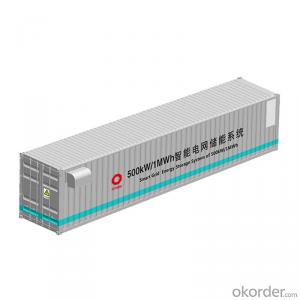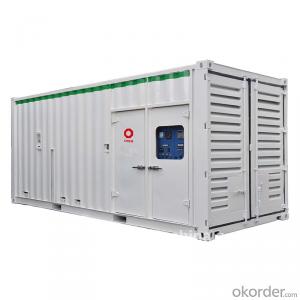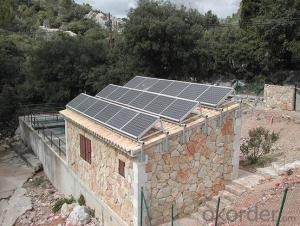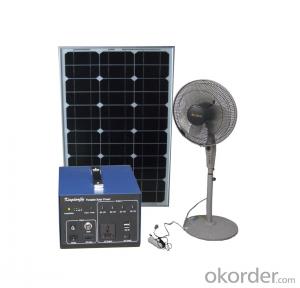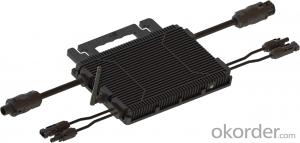ESS Solar Energy Storage System 500kw 1MWH With Lifepo4 Battery Container
- Loading Port:
- Shanghai
- Payment Terms:
- TT OR LC
- Min Order Qty:
- 1 unit
- Supply Capability:
- 10 unit/month
OKorder Service Pledge
OKorder Financial Service
You Might Also Like
Item specifice
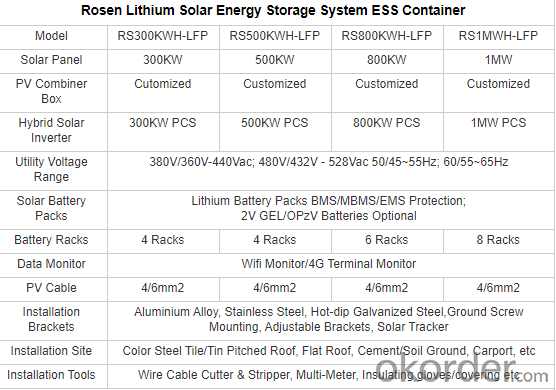
Solar Panels
Mono/Poly/felxible/black etc all types Panels;
High efficiency power up to 450W/ 550W/600W Half Cell/Bifacial Solar PV Modules;
All certificates listed with more than 30years life and warranty
PID Resistant,High salt and ammonia resistance;
Hybrid Energy Storage Inverter
Automatic Switch to charge loads, batteries or from Grid backup with priority setting function; Lithium Battery and GEL storage battery compatible with almost all types of inverters;Comprehensive WIFI monitor for electricity production and consumption data, to check your investment payment on time;
Solar Lithium/GEL Battery Packs
Lithium and GEL Storage Batteries Optional;
100Ah/150Ah/200Ah, with 100kwh/300kwh/500kwh capacity;
BMS Communication matched with almost all types of hybrid energy inverters;
Installation is convenient with cable, rack etc Accessories ready in package.
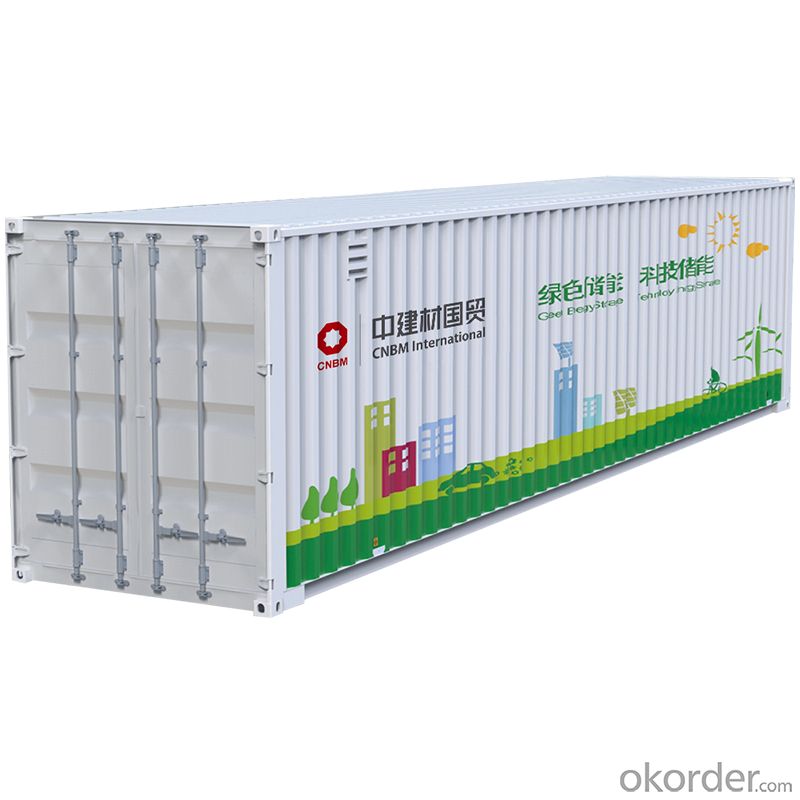
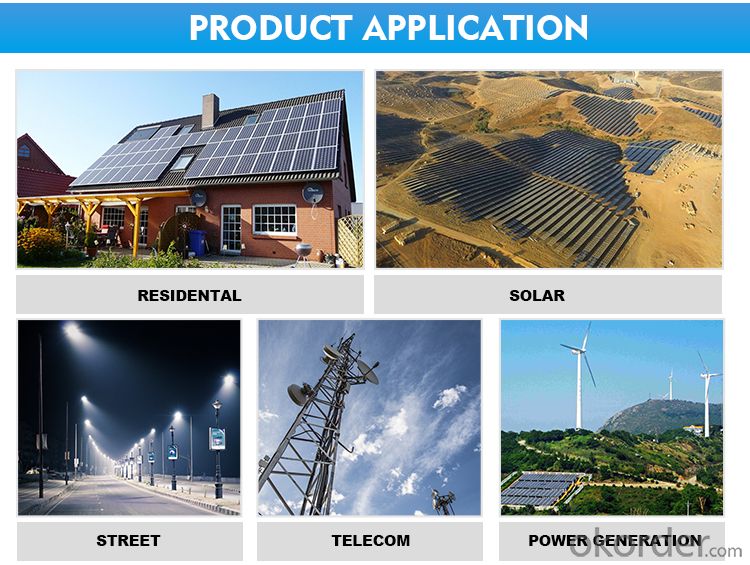
- Q:Can solar energy systems be used for powering off-grid agricultural processing facilities?
- Yes, solar energy systems can be used to power off-grid agricultural processing facilities. Solar panels can generate electricity from sunlight, which can be used to operate various machinery and equipment required for processing agricultural products. This renewable energy source is cost-effective, environmentally friendly, and can provide a reliable power supply in remote areas without access to the traditional power grid.
- Q:Can solar energy systems be installed on industrial facilities?
- Yes, solar energy systems can be installed on industrial facilities. In fact, many industrial facilities have already adopted solar energy as a viable and sustainable source of power. These systems can significantly reduce energy costs, decrease reliance on fossil fuels, and contribute to a greener and more sustainable future for industrial operations.
- Q:Can solar energy systems be used in areas with high levels of dust or debris?
- Yes, solar energy systems can be used in areas with high levels of dust or debris. However, it is important to regularly clean and maintain the solar panels to ensure optimal performance. Dust and debris can reduce the efficiency of the solar panels by blocking sunlight and reducing their ability to generate electricity. Additionally, the design and installation of solar systems can incorporate measures to minimize the impact of dust or debris accumulation, such as tilt angles and protective coatings.
- Q:Are solar energy systems suitable for all locations?
- No, solar energy systems are not suitable for all locations. The efficiency and effectiveness of solar energy systems depend on factors such as the amount of sunlight available, the angle and orientation of the solar panels, and local climate conditions. Locations with limited sunlight or frequent cloud cover may not be ideal for solar energy systems. Additionally, areas with high levels of shading, such as densely populated urban areas or heavily forested regions, may also not be suitable for solar installations.
- Q:How do solar energy systems affect wildlife?
- Solar energy systems can have both positive and negative effects on wildlife. On one hand, they provide renewable and clean energy, reducing greenhouse gas emissions and mitigating climate change's impact on habitats. On the other hand, the installation and operation of solar panels can disrupt or displace wildlife, particularly during construction and land clearing. However, with proper planning and design, solar energy systems can incorporate wildlife-friendly measures like habitat restoration and wildlife corridors, minimizing negative impacts and even creating new opportunities for biodiversity.
- Q:Can solar energy systems be used for powering electric vehicle recycling facilities?
- Yes, solar energy systems can definitely be used for powering electric vehicle recycling facilities. Solar power is a renewable and clean energy source that can be harnessed by installing solar panels on the facility's roof or in nearby open spaces. These panels can generate electricity by converting sunlight into usable energy. By utilizing solar energy, electric vehicle recycling facilities can significantly reduce their reliance on traditional grid electricity, which is often generated from fossil fuels. This transition to solar power not only helps in reducing greenhouse gas emissions but also decreases the facility's carbon footprint. Moreover, electric vehicle recycling facilities typically require a substantial amount of energy to power heavy machinery and equipment used in the recycling process. Solar energy systems can provide a reliable and constant source of electricity to meet these energy demands. Additionally, incorporating energy storage solutions, such as batteries, can ensure uninterrupted power supply even during periods of low sunlight or at night. Implementing solar energy systems in electric vehicle recycling facilities also aligns with the overall mission of promoting sustainability and environmental responsibility in the electric vehicle industry. It showcases a commitment to clean energy practices throughout the entire lifecycle of electric vehicles, from production to recycling. In conclusion, solar energy systems are a viable and environmentally-friendly option for powering electric vehicle recycling facilities. They offer a sustainable and reliable source of electricity, reduce reliance on fossil fuels, and contribute to a greener and cleaner future.
- Q:Can solar energy systems be used in remote areas without access to the power grid?
- Solar energy systems are indeed suitable for use in remote areas that lack access to the power grid. In fact, solar power often proves to be the perfect solution for such locations. These systems are comprised of solar panels that convert sunlight into electricity, which can then be used to power a variety of appliances and devices. Typically, off-grid remote areas do not have access to conventional electricity sources like power lines. However, solar energy systems offer an independent and sustainable power source. By harnessing the ample sunlight available in these areas, solar panels can generate electricity even without a power grid. In remote areas, solar energy systems can be designed to store excess energy in batteries. This ensures a continuous power supply, even on cloudy days or during the night. These battery systems enable the storage of solar-generated electricity, providing a dependable power source for various needs, such as lighting, communication devices, water pumps, refrigeration, and even small businesses. Moreover, the installation and upkeep of solar energy systems in remote areas are often more cost-effective compared to extending power lines from the grid. Solar panels have become increasingly affordable in recent years, and advancements in technology have boosted their efficiency and durability. Additionally, the absence of fuel expenses and the minimal requirement for ongoing maintenance make solar energy systems a sustainable and cost-efficient solution for remote areas. All in all, solar energy systems are an excellent choice for powering remote areas without access to the power grid. They offer a sustainable, reliable, and cost-effective source of electricity, enabling the growth and enhancement of communities in these remote locations.
- Q:Can solar energy systems be used for agricultural applications?
- Yes, solar energy systems can be used for agricultural applications. Solar panels can be used to power various agricultural operations such as irrigation systems, water pumps, and electric fences. Additionally, solar energy can be used in greenhouses to provide heating, lighting, and ventilation. Overall, utilizing solar energy in agriculture can help reduce reliance on traditional energy sources and contribute to sustainable farming practices.
- Q:Can solar energy systems be used for powering off-grid cabins?
- Yes, solar energy systems can be used for powering off-grid cabins. Solar panels can be installed on the roof or in nearby areas with good sunlight exposure to capture and convert the sun's energy into electricity. This electricity can then be used to power the cabin's lights, appliances, and other electrical needs, providing a sustainable and renewable energy source. Additionally, solar energy systems can often be combined with battery storage to store excess energy for use during nighttime or cloudy days, ensuring a continuous power supply for off-grid living.
- Q:Can solar energy systems be used for powering disaster relief efforts?
- Yes, solar energy systems can be used for powering disaster relief efforts. Solar power provides a reliable and sustainable source of energy, especially in areas where the conventional power grid may be disrupted or unavailable due to a disaster. Solar energy systems can be quickly deployed and can provide electricity to power medical facilities, communication systems, lighting, and other essential equipment during relief operations. They are also cost-effective in the long run and reduce dependency on fossil fuels, making solar energy an ideal solution for disaster-affected areas.
1. Manufacturer Overview |
|
|---|---|
| Location | |
| Year Established | |
| Annual Output Value | |
| Main Markets | |
| Company Certifications | |
2. Manufacturer Certificates |
|
|---|---|
| a) Certification Name | |
| Range | |
| Reference | |
| Validity Period | |
3. Manufacturer Capability |
|
|---|---|
| a)Trade Capacity | |
| Nearest Port | |
| Export Percentage | |
| No.of Employees in Trade Department | |
| Language Spoken: | |
| b)Factory Information | |
| Factory Size: | |
| No. of Production Lines | |
| Contract Manufacturing | |
| Product Price Range | |
Send your message to us
ESS Solar Energy Storage System 500kw 1MWH With Lifepo4 Battery Container
- Loading Port:
- Shanghai
- Payment Terms:
- TT OR LC
- Min Order Qty:
- 1 unit
- Supply Capability:
- 10 unit/month
OKorder Service Pledge
OKorder Financial Service
Similar products
New products
Hot products
Hot Searches
Related keywords
